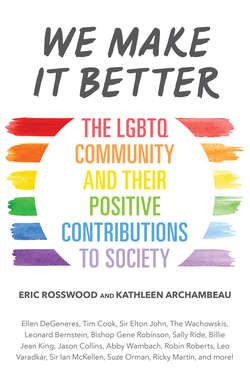Читать книгу We Make It Better - Eric Rosswood - Страница 12
На сайте Литреса книга снята с продажи.
ОглавлениеChances are you’ve heard of Martin Luther King Jr. and his famous “I Have a Dream” speech, but did you know Bayard Rustin, an openly gay man, was a mentor to King and instrumental in organizing the March on Washington, where that speech was given?
Rustin, who was no stranger to fighting for equal rights, traveled to India in the 1940s and studied the nonviolent resistance practices taught by Mahatma Gandhi. He combined those teachings with the pacifism of the Quaker religion and the socialism supported by African-American labor leader A. Philip Randolph to come up with his own approach to fighting for equal rights. In the 1950s, he met Dr. Martin Luther King Jr. and advised him on the tactics of nonviolent civil disobedience.
As a mentor to King, Rustin helped him organize the successful Montgomery bus boycott, which ultimately led to the Supreme Court ruling it unconstitutional for Alabama and Montgomery to legally require segregation on their public transit system. He remained a close advisor to King for the next few years.
In the 1960s, Rustin became the Deputy Director for the March on Washington for Jobs and Freedom. He was a key strategist for the march, and, with his team, created and distributed a manual, which included demands and a roadmap that helped transform American civil rights, labor rights, and education and housing policies. This policy agenda played a crucial role in helping to secure passage of the Civil Rights Act of 1963 and the Voting Rights Act of 1964.
Rustin was involved in numerous boycotts and protests throughout his life, always fighting to protect and advance the rights of minority groups. He died in 1987 and was survived by Walter Naegle, his partner of ten years.
In 2013, Rustin was selected as an honoree in the United States Department of Labor Hall of Honor. That same year, President Obama posthumously awarded him the Presidential Medal of Freedom, the highest civilian award in the United States. Even though Rustin was pushed behind the scenes because of his sexuality and political affiliations, he leaves behind a legacy that helped transform equal rights in the United States.
